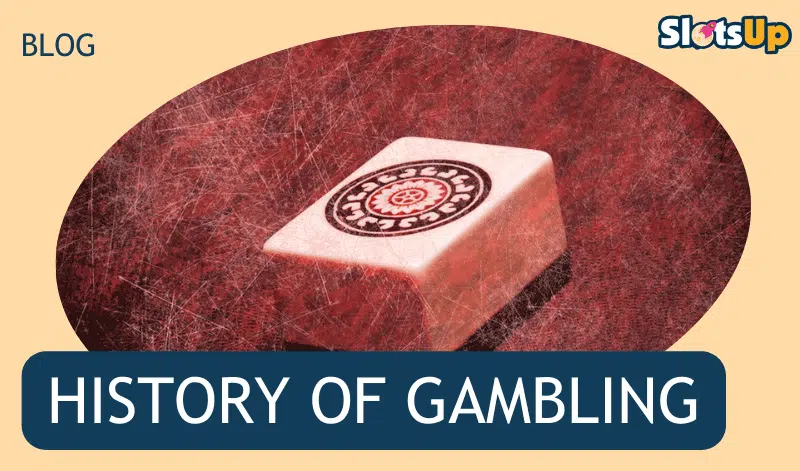
History of Gambling
Free and real money gaming is widely recognized as the most sought-after option to spend leisure time. This method of entertainment can definitely fuel your veins with adrenaline and endorphins, enabling you to relax with your favorite games. The list includes something as intuitive as slots and more complicated developments like table games and live poker.
Being wholly involved is welcome, but changing your perspective is reasonable too. The more you know about the industry and its progress, the more delight and respect will occur towards its performance. Gifts for granted aren’t as appreciated as things achieved through a specific effort — this law is proven by the world history of interactive gaming. Stay tuned to get a clearer understanding of how people once created this concept.
From local developments and innovations and up to the history of online gambling, the more pieces of information you will obtain, the clearer the future journey will become. Forearmed is forewarned. Onwards!
General History of Gambling
The history of gambling can be easily compared with a series of books or movies — each part can have unique plots, but they are tightly interconnected. Without even a little discovery in ancient times, the gambling universe people admire at the moment would have been absolutely unlike.

Here is a brief overview of how the industry developed throughout the ages in the global arena:
- According to the evidence found, the earliest gambling signs can be tracked up to 4000 BC. There are notes in the papyri about establishing laws to prevent industrial development in the region. The Egypt civilization treasures have been thoroughly explored, and one tomb showed an exciting finding — gambling artifacts in the form of dice and discs for games that were favorite back then.
- The revolutionary establishment of people’s relationships, including their economic, political, and other interactions, couldn’t help but lead to tighter connections in their daily life and entertainment. Ancient China is believed to be among the cradle sources of this industry. Aside from some betting formats, the references to creating separate wooden blocks for gaming of a lottery-type are found in the famous “The Classic of Poetry,” the oldest Chinese collection of rhyme patterns, dated 2300 BC.
- Undoubtedly, the culture of Ancient Rome and its traditions have become one of the most influential powers for humanity’s progress and development. Circa 500 BC — according to studies and found works of that period (including those written by Sophocles), dice were invented. Their history was mythologically connected with a remarkable hero of the Troy epoch.
- The history of gambling has left its evidence in different ages. Another stage of its development is circa 800 AD. The glory of the invention of playing cards belongs to China, where the first matches between individuals were held. Although the exact rules were lost, and those creations could hardly be compared with a modern fifty-two-card deck, it was a huge milestone.
- The medieval times allowed this industry to blossom. There is a special marking on the gambling history tree, dating back 1400s. This period is believed to be the moment of the invention of the Baccarat. It evolved from a noble way to entertain in Italy to a more accessible solution in France and other countries in Europe.
- The earliest formats of blackjack, another game that doesn’t stop conquering gambling souls, is suggested to be created in Spain, circa 1600. Meanwhile, the spread of gaming varietals took place actively. These small steps led to a huge breakthrough — the first casinos were launched in Italy in 1638.
- Since 1796, roulettes has become an official member of any prestige casino and analogous institution/party.
- The boom of poker is another milestone in the world history of gambling. The earliest forms were known to be played in New Orleans in 1829.
- The advancement of technologies will always impact industries and their performances. That happened with the invention of one-armed bandits in 1891.
- The new frontier for the field under consideration happened in 1994. Gambling-enthusiasts will always owe Microgaming a lot. This software provider isn’t only famous as a trendsetting brand and a pioneering platform for internet-based gambling activities.
History of Gambling in China
Some records of people interested in gaming for real money can be traced back to 4000 BC. This nation is known for its incredible contribution to the game variety. Although such solutions as fan-tan and pai gow don’t seem pretty recognizable in the twenty-first century, especially compared to roulettes and poker. Their worth shouldn’t be underestimated since they influenced the emergence and styling of offline and online playing fields that are popular now.

China was a place of “birth” for such familiar gaming layouts as mahjong and lottery, which keep up with their expansion rates. Given their long-documented story of falling in love with gambling, it should come as no surprise this land has always been active in preparing certain conditions in the economic and legal framework to control this sphere of life:
- Shanghai is one of the most magnetic attractions for gambling lovers. This place started its evolution in such a role in the middle of the 1800s. The region map was filled with multiple land-based organizations, where enthusiasts could participate in roulette and local game competitions.
- In 1847, the analyzed activity was legalized in Macau. This decision indeed led to the intense commercial establishment of the field. Over time and mainly because of the civil war in the country, the prestige of official gambling was reduced.
Analyzing the history of gambling in China, the following conclusion can be made. The country’s law banned this industry in 1949, but it still remains a highly catching field for residents. It can’t help but promote the international history of online gambling, where participants from multiple lands are welcome.
European Stories: History of Gambling in the UK
The history of online gambling UK has become the next part of the industry’s development. Its decent support of the field today is what makes its casino licenses one of the most desired legal frameworks to operate within. The oldest gambling institution in the country was opened in 1823, but non-commercial betting and similar activities were popularized long before:
- The first lotteries of the national format were arranged in 1566 and lasted three years. There were numerous private organizations holding lotteries, including the English State Lottery, which was closed in 1826 and offered its services for over a century.
- The eighteenth century was a noticeable milestone in gambling history in the UK. Unlike the Unlawful Games Act 1541, other laws legalized the field. The most potent guidance is offered by the framework established in 1845.
History of Gambling in Australia
On the list, this is one of the most gambling-friendly countries. The nation is believed to be the most active in constant participation in sportsbooks, online/offline tournaments, and competitions. It is strictly regulated by law limits its evolution to some extent. Still, it is a vast support gesture of its local residents — the risks of coming across poor-quality establishments are minimized.
Since the 1850s, the most popular form of betting has been horse-racing. When it comes to the history of gambling casinos themselves, the pioneer center was launched in 1978. Hobart’s “colleagues” in other regions followed this decision and implemented their own gambling stations, regulated by both federal and state legal principles from 1979 to 1982.
Given the modern history of sports gambling is controlled by the government, including bans on advertising their services to target audiences, this region is distinguished with divergent playing options, bonus systems, and interactive websites to reduce the negative effect of the existing prohibitions.
The Evolution of Online Gambling History
The history of internet gambling started in 1994 in Antigua and Barbuda, where the concept of providing licenses for online-based establishments was introduced to reality. Every following year was noticeable for particular achievements in the field:
- Two years after the first software was introduced, over fifteen establishments were registered.
- In 1997, InterTops started working with online bettors, accepting their stakes.
- In the 2000s, the pioneer mobile online casinos were developed.
- As an important milestone in the history of gambling in the USA, the year 2006 is known by experts in the market — that is when online gaming for real money was banned. At the same time, a year after, Texas Holdem, a famous application for mobile devices, was released by the Apple company.
- In 2011, online casinos in the country were legalized. Two years later, developers presented a platform that supported cryptocurrency payments.
Naturally, with the advancement of modern technologies, the people’s desire to overcome the established laws increases. That led to the biggest scandal in the history of online gambling. Unlike the Black Sox in the 1919 World Series or other offline cases of breaking the rules, the online medium conflicts can be subdivided into two main categories:
- when casinos refuse to pay out the received prizes;
- when users apply tricky schemes to succeed and win.
One of the reasons that this activity is so banned in the history of gambling addiction itself. Governments worldwide put a lot of effort into controlling the flaws and side-effects of gaming for real money. With the advancement of internet-based technologies, access to professional support and services to limit your gambling performance has become widespread and simplified. As practice shows, online gambling is more capable of controlling and preventing this challenge for any lovers to play risky games:
- Websites of this kind provide details about responsible gambling and appropriate contacts if you have the slightest signs of the problem.
- Advanced platforms allow users to restrict their deposit sums. In practice, you won’t be able to gamble more for real once the limit is reached.
Future of Gambling
The history of online gambling is likely to be prominent for future generations. With their gorgeousness and luxury, land-based slots will remain a crucial opportunity for people to create solid bonds in high society and get a real taste of gaming for real money. However, online activities are predicted to gain even more popularity over time:
- In numerous countries, the online sector of the industry isn’t regulated by laws at all. So many lands will solve this problem in the nearest future, either legalizing or banning this activity.
- The implementation of VR and AR technologies levels up the online gambling stage. This atmosphere of live presence in the hall when you are at home, and other bonuses can’t help but make customers long for more features and developments.
From the moment of their invention in 1994 and till now, their benefits are what fuel high rates of customer loyalty and awareness:
- Safety and security — your funds are protected by encryption and other existing measures, including the opportunity to pay via cryptocurrency transactions.
- Divergence — the online medium has already designed a more significant number of games, slots, and related services than its offline competitors. This speed of performance is likely to be preserved and even surpassed.
- Profitability — in the long run, online casinos promise more rewards. Both regular and progressive jackpot solutions have a more favorable return to the player percentage. The higher this parameter, the more efficient your investment will be.
- Loyalty programs — offline establishments don’t usually welcome their guests with excellent bonuses for participating in their poker rounds, unlike their rivals. The range of online bonuses varies from registration prizes to cashback guarantees.
Wrap It Up
Overall, the world history of gambling has its own ups and downs. Even though this activity isn’t likely to be accepted in every country legally sooner than later, its popularity will be backed up by cost-efficient, multifunctional, and interactive online platforms. Offline casinos won’t fade into obscurity, but their influence on the industry’s overall development is expected to be lessened in the long run.






